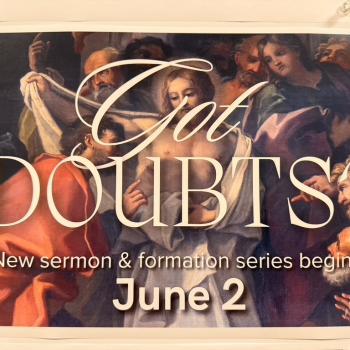Over the years I have written on the subject of suffering. I didn’t set out to do that. It has been the object of human reflection for as long as people have strung sentences together. To say that an ocean of ink has been spilled over the subject is an understatement. It is also impossible to say anything utterly new about it.
But over the years I wrote two books on the subject[1] and a long string of articles.[2] Two things prompted me to write about it. And like the subject matter itself, I am sure that there is nothing original about my motives.
One was the experience of loss and suffering itself. My adolescence was anything but carefree. Two car accidents – one when I was in junior high school and a second accident in my senior year in high school forced me to spend most of six years in a back brace, a wheelchair, or both. The second accident also claimed the life of my friend and debate team coach. In the years that followed, life has also been anything but straightforward. My parents and younger brother died years ago. I am unavoidably estranged from my sister. I have been through unemployment and divorce.
This is not to say that my life has been more troubled than that of others. Even at its worst, I have been far more fortunate than many, if not most. But those experiences and others did force me to pay particular attention to the varied ways in which life dogged by loss.
The other thing that prompted me to write about suffering was the hurtful advice and guidance that people often give those who suffer. By and large, that advice has been well-meant and offered by good people. But in spite of that, I have watched those good and well-meaning people make their friends and relatives far more miserable than they already were by telling them that the hard places they find themselves in is God’s will, a blessing in disguise or evidence that they are not praying with faith.
As a result, the books I have written are intended to help people find a way to keep praying and trusting in God without denying how hard life can really be at times. I have tried to be as honest as possible about life and its hardships and I have resisted offering easy solutions.
I haven’t been particularly concerned to write for people who have been lucky enough not to struggle. I haven’t been all that interested in writing for Christians who breeze through life, and I haven’t been at all sympathetic to happy-clappy Christianity or the health and wealth gospel.
And, yes, I am still good with that.
But that effort can sometimes make it sound as if I don’t believe God is intimately involved in the world and that I don’t believe in prayer and that isn’t true. I do believe in prayer, and I do believe that God is intimately involved in our lives.
What I don’t believe in is magic. Magical thinking holds that if we use certain techniques and if we approach prayer with a specific mindset, then the challenges we face can be made to go away. You see that approach in health and wealth preachers, like Benny Hinn and Joel Osteen. But it also creeps into a lot of what garden variety Christians say about prayer. Essentially the magical approach to prayer says, “Pray this way, with this frame of mind, don’t doubt, don’t struggle, and your prayers will make illness and other hard places disappear.”
Thought of that way, a relationship with God becomes entirely secondary to the act of prayer. It is more about manipulating the world around us than it is about relying on God. To use a human analogy, praying this way would be a bit like saying, “If you want to make a marriage work, use the following the words and ploys and you can make your spouse do what you want him or her to do.” If couples related to one another in that fashion, then loving and trusting another human being would be entirely beside the point.
But Scripture and the Christian tradition teaches that prayer is all about love, trust, and a relationship with God. When we pray, what we are doing is asking for God to come alongside us: To support us, to heal us, to strengthen and direct us. More importantly, as we mature in our faith, we are also asking God to teach us how to live in a way that is shaped by availability to the purposes of God. But how that journey unfolds does not depend upon magical formulae and our effort, but upon the goodness of God.
The life of Jesus is instructive. At times, Jesus looks to the heavens, prays to God, immediately an answer is given, and the answer corresponds to the request. There are other times that the gift Jesus gives is not the gift that someone seeks. They ask for healing, but they are forgiven their sins. At still other times, God doesn’t answer the prayer at all, or not in the way one might hope. Jesus’s own prayer in the Garden of Gethsemane is a perfect illustration. Jesus prays that “this cup” (the experience of death on the cross) might pass from him, but it doesn’t.
Prayer, then, is not a method for getting what we want, but a means of opening ourselves up to a relationship with God. The answers seem to matter less than our dependence upon God. And the consequences of our prayers seems to be entirely in God’s hands.
I think that it is also important to remember that we are urged to pray in a world where people die, bad things happen to good people, and the healing that God promises awaits fulfillment. The “signs and wonders” that Jesus performs point to the nature of the Kingdom that is breaking in on this broken world and will – in God’s time – take hold everywhere and forever.
But this is not that world – yet. This world is broken and enslaved to death. God’s conquest is under way and the power of death has been broken, but its impact remains to be felt. By way of analogy, think of the invasion of Normandy, the inevitable downfall of the Third Reich, and the misery it caused for months to follow, circa July 1, 1944. The defeat of Germany was guaranteed, but the struggle continued.
The same is true of the Kingdom of God. It arrives with Christ and the defeat of death is insured. But the struggle continues, perhaps in part, perhaps primarily, so that more of our sisters and brothers can be touched by its freedom. So, when we open ourselves in prayer to God, whose healing power in Christ is making in-roads into our world, we do so in a time and place where the struggle continues.
The connection between those two worlds and the underlying conviction that this world is God’s creation and the object of God’s healing purpose, also shapes one other conviction that I have about prayer: I believe that God not only intervenes on our behalf in ways that might be described as supernatural, but in ways that we might describe as natural. Friendships, acts of kindness, courageous action, sacrificial love, unexpected mercy, medicine, physicians, and our bodies all promote healing as well. And those dynamics are just as much the work of God as anything else.
The other thing that I find is important to remember is that God’s response to our prayers in the middle of that struggle is not confined to the extraordinary or miraculous. Because the world that God is reclaiming is this one and because it is the world of God’s making, every turn toward the light is God’s doing: acts of love and mercy, generosity toward the poor and disenfranchised, the sacrificial efforts of first responders and caregivers, the genius of modern medicine, the skill of a surgeon, the healing properties of our bodies. All these things and others and not just the exceptional can be traced to God and can be considered answers to our prayers.
Distinguishing between the natural and the supernatural – attributing the former to nature and the latter to God – lies at the heart of a fundamentally unchristian of thinking about prayer. God’s answers to our prayers are not confined to the exceptional. God is not present in the miraculous alone. If one believes that God is the creator and that creation is product of his life-giving breath, then what we describe as natural is just as much a part of God’s work in our world, as the activity we count as supernatural. And both are part of God’s on-going and ever-present activity in the world.
Prayers, then, are always being answered. God’s grace and love is always taking shape in our world. Signs and wonders are everywhere to be seen. The influence spreads across and around the world.
This last observation brings me back to where we began. Do I believe in prayer? Yes. But it might be better to say that I believe in the goodness of God in Christ, and – because I do – I trust in prayer as a means of drawing close to God, of opening myself to his love, and as the means by which I place myself back in God’s hands – moment by moment, day by day.
My confidence in that truth is not eroded by prayers that seemingly go unanswered. It is not eroded by the days, weeks, months, or years that roll on without resolution. It rests in what I have learned and experienced of God’s goodness, and it is there that I will remain until one day God’s embrace will enfold and heal us all.
[1] When Suffering Persists (Morehouse Publishing, 2001) and The Dave Test, A Raw Look at Real Faith in Hard Times (Nashville: Abingdon, 2013).
[2] At least 19, by my count, probably more. Many of them at my page on Patheos.com
Photo by Adrian Swancar on Unsplash












